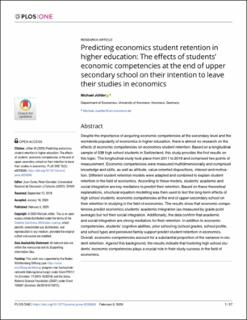Please use this identifier to cite or link to this item:
https://doi.org/10.21256/zhaw-28389Full metadata record
| DC Field | Value | Language |
|---|---|---|
| dc.contributor.author | Jüttler, Michael | - |
| dc.date.accessioned | 2023-08-04T08:56:29Z | - |
| dc.date.available | 2023-08-04T08:56:29Z | - |
| dc.date.issued | 2020 | - |
| dc.identifier.issn | 1932-6203 | de_CH |
| dc.identifier.uri | https://digitalcollection.zhaw.ch/handle/11475/28389 | - |
| dc.description.abstract | Despite the importance of acquiring economic competencies at the secondary level and the worldwide popularity of economics in higher education, there is almost no research on the effects of economic competencies on economics student retention. Based on a longitudinal sample of 538 high school students in Switzerland, this study provides the first results on this topic. The longitudinal study took place from 2011 to 2016 and comprised two points of measurement. Economic competencies were measured multidimensionally and comprised knowledge and skills, as well as attitude, value-oriented dispositions, interest and motivation. Different student retention models were adapted and combined to explain student retention in the field of economics. According to these models, students' academic and social integration are key mediators to predict their retention. Based on these theoretical explanations, structural equation modelling was then used to test the long-term effects of high school students' economic competencies at the end of upper-secondary school on their retention in studying in the field of economics. The results show that economic competencies predict economics students' academic integration (as measured by grade point average) but not their social integration. Additionally, the data confirm that academic and social integration are strong mediators for their retention. In addition to economic competencies, students' cognitive abilities, prior schooling (school grades, school profile, and school type) and perceived family support predict student retention in economics. Overall, economic competencies account for a substantial proportion of the variance in student retention. Against this background, the results indicate that fostering high school students' economic competencies plays a crucial role in their study success in the field of economics. | de_CH |
| dc.language.iso | en | de_CH |
| dc.publisher | Public Library of Science | de_CH |
| dc.relation.ispartof | PLOS ONE | de_CH |
| dc.rights | http://creativecommons.org/licenses/by/4.0/ | de_CH |
| dc.subject | Achievement | de_CH |
| dc.subject | Adolescent | de_CH |
| dc.subject | Adult | de_CH |
| dc.subject | Female | de_CH |
| dc.subject | Economics | de_CH |
| dc.subject | Academic skills | de_CH |
| dc.subject | Social skills | de_CH |
| dc.subject | Standardized test | de_CH |
| dc.subject.ddc | 330: Wirtschaft | de_CH |
| dc.subject.ddc | 371: Schulen und schulische Tätigkeiten | de_CH |
| dc.title | Predicting economics student retention in higher education : the effects of students' economic competencies at the end of upper secondary school on their intention to leave their studies in economics | de_CH |
| dc.type | Beitrag in wissenschaftlicher Zeitschrift | de_CH |
| dcterms.type | Text | de_CH |
| zhaw.departement | School of Management and Law | de_CH |
| zhaw.organisationalunit | Zentrum für Innovative Didaktik (ZID) | de_CH |
| dc.identifier.doi | 10.1371/journal.pone.0228505 | de_CH |
| dc.identifier.doi | 10.21256/zhaw-28389 | - |
| dc.identifier.pmid | 32023319 | de_CH |
| zhaw.funding.eu | No | de_CH |
| zhaw.issue | 2 | de_CH |
| zhaw.originated.zhaw | Yes | de_CH |
| zhaw.pages.start | e0228505 | de_CH |
| zhaw.publication.status | publishedVersion | de_CH |
| zhaw.volume | 15 | de_CH |
| zhaw.publication.review | Peer review (Publikation) | de_CH |
| zhaw.funding.snf | 130301 | de_CH |
| zhaw.webfeed | W: Spitzenpublikation | de_CH |
| zhaw.author.additional | No | de_CH |
| zhaw.display.portrait | Yes | de_CH |
| Appears in collections: | Publikationen School of Management and Law | |
Files in This Item:
| File | Description | Size | Format | |
|---|---|---|---|---|
| 2020_Juettler_Predicting-economics-student-retention-in-higher-education.pdf | 1.61 MB | Adobe PDF |  View/Open |
Show simple item record
Jüttler, M. (2020). Predicting economics student retention in higher education : the effects of students’ economic competencies at the end of upper secondary school on their intention to leave their studies in economics. Plos One, 15(2), e0228505. https://doi.org/10.1371/journal.pone.0228505
Jüttler, M. (2020) ‘Predicting economics student retention in higher education : the effects of students” economic competencies at the end of upper secondary school on their intention to leave their studies in economics’, PLOS ONE, 15(2), p. e0228505. Available at: https://doi.org/10.1371/journal.pone.0228505.
M. Jüttler, “Predicting economics student retention in higher education : the effects of students’ economic competencies at the end of upper secondary school on their intention to leave their studies in economics,” PLOS ONE, vol. 15, no. 2, p. e0228505, 2020, doi: 10.1371/journal.pone.0228505.
JÜTTLER, Michael, 2020. Predicting economics student retention in higher education : the effects of students‘ economic competencies at the end of upper secondary school on their intention to leave their studies in economics. PLOS ONE. 2020. Bd. 15, Nr. 2, S. e0228505. DOI 10.1371/journal.pone.0228505
Jüttler, Michael. 2020. “Predicting Economics Student Retention in Higher Education : The Effects of Students’ Economic Competencies at the End of Upper Secondary School on Their Intention to Leave Their Studies in Economics.” Plos One 15 (2): e0228505. https://doi.org/10.1371/journal.pone.0228505.
Jüttler, Michael. “Predicting Economics Student Retention in Higher Education : The Effects of Students’ Economic Competencies at the End of Upper Secondary School on Their Intention to Leave Their Studies in Economics.” Plos One, vol. 15, no. 2, 2020, p. e0228505, https://doi.org/10.1371/journal.pone.0228505.
Items in DSpace are protected by copyright, with all rights reserved, unless otherwise indicated.